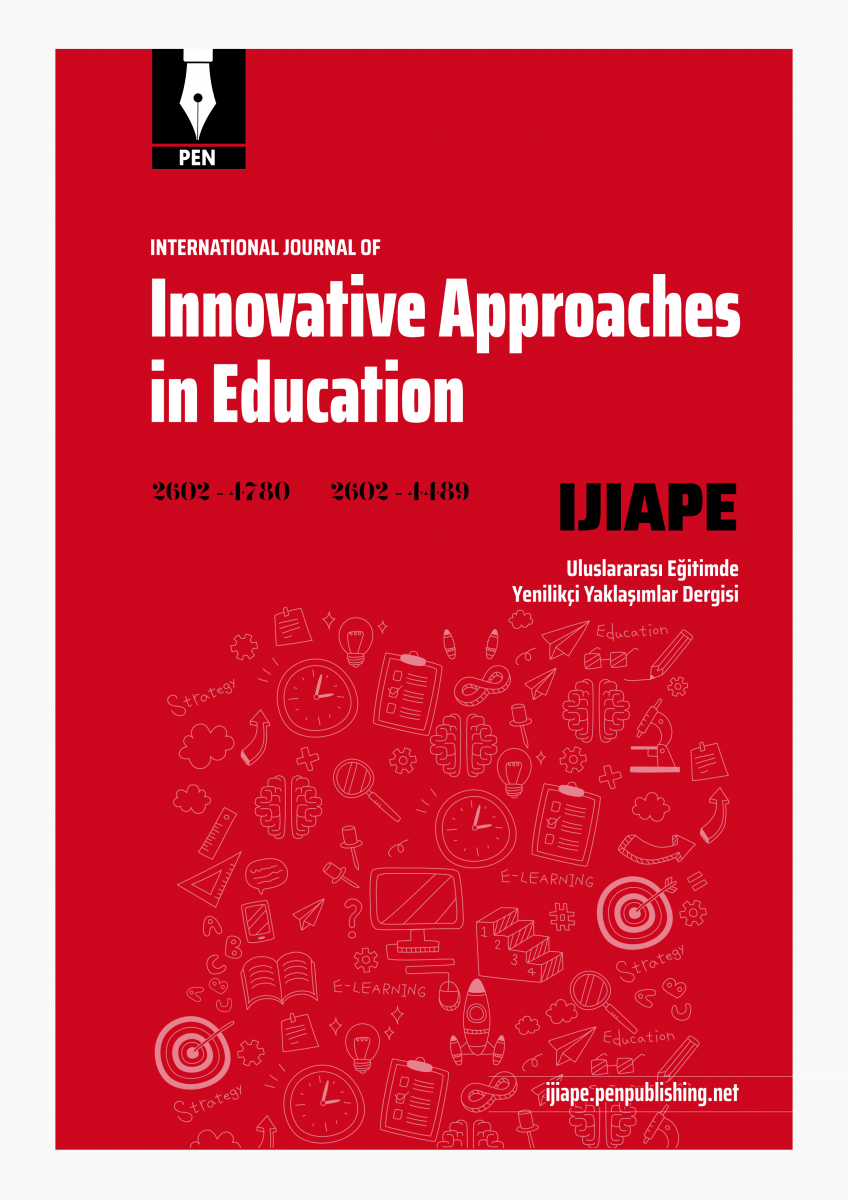- Akkağıt, Ş. F. & Tekin, A. (2012). Simülasyon Tabanlı Öğrenmenin Ortaöğretim Öğrencilerinin Temel Elektronik ve Ölçme Dersindeki Başarılarına Etkisi. Ege Eğitim Dergisi, 13 (2), 1-12. [Google Scholar]
- Alisinanoğlu, F., Özbey, S., & Kahveci, G. (2011). Okul öncesinde fen eğitimi. Maya Akademi. [Google Scholar]
- Ayas, A. (1995). Lise 1 kimya öğrencilerinin maddenin tanecikli yapısı kavramını anlama seviyelerine ilişkin bir çalışma. II. Ulusal Fen Bilimleri Eğitimi Sempozyumu’nda sunulan bildiri. ODTÜ Eğitim Fakültesi, Ankara. [Google Scholar]
- Benli, E., Kayabaşı, Y., & Sarıkaya, M. (2012). İlköğretim 7. sınıf öğrencilerinin fen ve teknoloji dersi “ışık" ünitesinde teknoloji destekli öğretimin öğrencilerin fen başarısına, kalıcılığa ve fene karşı tutumlarına etkisi. Gazi University Journal of Gazi Educational Faculty .32(3), 733-760. [Google Scholar]
- Çevik, E. (2006). Bilgisayar Destekli Kimya Eğitimi İle İlgili Öğretmen ve Öğrenci Görüşleri [Google Scholar]
- [Yayınlanmamış Yüksek Lisans Tezi]. Hacattepe Üniversitesi. [Google Scholar]
- Dikmen, M., & Tuncer, M. (2018) Bilgisayar destekli eğitimin öğrencilerin akademik başarıları üzerindeki etkisinin meta-analizi: son 10 yılda yapılan çalışmaların incelenmesi. Turkish Journal of Computer and Mathematics Education. 9 (1), 97-121. [Google Scholar]
- Elçiçek, M. & Bahçeci, F. (2017) Mobil öğrenme yönetim sisteminin öğrenenlerin akademik başarısı ve tutumları üzerindeki etkilerinin incelenmesi. Kastamonu Eğitim Dergisi, 25 (5), 1695-1714. [Google Scholar]
- Ergün, M. (1994). Eğitim sosyolojisi. Ocak Yayınları. [Google Scholar]
- Erden, M,. K,. & Uslupehlivan,. Eda,. (2020). Eğitimde teknoloji kullaniminin bugünü ve geleceğine ilişkin öğretmen adaylarinin düşüncelerinin incelenmesi. Uşak Üniversitesi Sosyal Bilimler Dergisi, 1(2020), 109-126. [Google Scholar]
- Emrahoğlu, N., & Bülbül, O. (2010) 9. sınıf fizik dersi optik ünitesinin bilgisayar destekli öğretiminde kullanılan animasyonların ve simülasyonların akademik başarıya ve akılda kalıcılığa etkisinin incelenmesi. Çukurova Üniversitesi Sosyal Bilimler Enstitüsü Dergisi, 19(3), 409-422. [Google Scholar]
- Fer, S. & Cırık İ., (2007). Yapılandırmacı öğrenme kuramdan uygulamaya. Morpa Yayınları. [Google Scholar]
- İşman, A., (2008). Uzaktan eğitim. Pegem Akademi. [Google Scholar]
- Gül, G. (2004). Birey toplum eğitim ve öğretmen. Hasan Ali Yücel Eğitim Fakültesi Dergisi. 1 (1), 223-236. [Google Scholar]
- Güven, G., & Sülün, Y. (2012). Bilgisayar destekli öğretimin 8. sınıf fen ve teknoloji dersindeki akademik başarıya ve öğrencilerin derse karşı tutumlarına etkisi. Journal of Turkish Science Education, 9(1), 68-79. [Google Scholar]
- Gömleksiz, M. N. & Fidan, E. K. (2012). Fen ve teknoloji dersinde bilgisayar destekli zihin haritası tekniğinin öğrencilerin akademik başarısına, tutumlarına ve kalıcılığa etkisi. Gaziantep Üniversitesi Sosyal Bilimler Dergisi, 12(3), 403-426. [Google Scholar]
- Kaptan, F. (1998). Fen Bilgisi Öğretiminin Niteliği ve Amaçları (Ed. Ş. Yaşar), Fen Bilgisi Öğretimi, (ss.13-30). T.C. Anadolu Üniversitesi Yayınları. [Google Scholar]
- Kaptan, F. (1999). Fen Bilgisi Öğretimi. Milli Eğitim Basımevi. [Google Scholar]
- Kaptan, F., & Korkmaz, H., (2000). İlköğretimde Etkili Öğretme ve Öğrenme Öğretmen El Kitabı İlköğretimde Fen Bilgisi Öğretimi. MEB Yayınevi. [Google Scholar]
- Karasar, N. (2005). Bilimsel araştırma yöntemleri. Nobel Yayıncılık. [Google Scholar]
- Kulik, JA, Bangert, RL & Williams, GW (1983). Bilgisayar destekli öğretimin ortaokul öğrencileri üzerindeki etkileri. Eğitim Psikolojisi Dergisi, 75 (1), 19–26. https://doi.org/10.1037/0022-0663.75.1.19. [Google Scholar] [Crossref]
- Karaduman, B. & Emrahoğlu, N. (2011). “Maddenin tanecikli yapisi” ünitesinin öğretiminde, bilgisayar destekli ve bilgisayar temelli öğretim yöntemlerinin, akademik başari ve kaliciliğa etkisi. Kastamonu Eğitim Dergisi, 19 (3), 925-93. [Google Scholar]
- Küçük, T. (2014) Işık ünitesinde simülasyon kullanımının öğrencilerin akademik başarısına ve fen tutuma etkisi [Yayınlanmamış Yüksek lisans Tezi], Çanakkale Onsekiz Mart Üniversitesi. [Google Scholar]
- Liao, Y. K. C. (2007). Effects of computer-assisted instruction on students’ achievement in Taiwan: A meta-analysis. Computers & Education, 48(2), 216-233. [Google Scholar]
- Milli Eğitim Bakanlığı (2013). İlköğretim kurumları (ilkokullar ve ortaokullar) fen bilimleri dersi (3, 4, 5, 6, 7 ve 8. sınıflar) öğretim programı. Ankara: Talim Terbiye Kurulu Başkanlığı. [Google Scholar]
- Milli Eğitim Bakanlığı (2017). İlköğretim kurumları (ilkokullar ve ortaokullar) fen bilimleri dersi (3, 4, 5, 6, 7 ve 8. sınıflar) öğretim programı. Ankara: Talim Terbiye Kurulu Başkanlığı. [Google Scholar]
- Musawi, A. A., Ambusaidi, A., Al-Balushi, S., Al-Sinani, M., & Al-Balushi, K. (2017). Effectiveness of Learning with 3D-Lab on Omani Basic Education Students' Achievement, Attitudes and Scientific Thinking. Journal of Education and Training Studies, 5(11), 177-188. [Google Scholar]
- Onur, J. (2021). Sınır tanımayan eğitim modeli: IB. [Google Scholar]
- Salgut, B. (2012). İlköğretim 5. Sınıf fen ve teknoloji dersi ışık ve ses ünitesinde internetin de kullanıldığı bilgisayar destekli öğretimin öğrenci başarısına etkisi [Yüksek Lisans tezi], Çukurova Üniversitesi. [Google Scholar]
- Sasikala, P., & Tanyong, S. (2016). A Study on Simulation Methods in Academic Success with Reference to Teaching Biology for Education Students. Journal of Education and Practice, 7(11), 164-168. [Google Scholar]
- Şahin, R. & Akbaba, U. (2018). Bilgisayar Destekli Öğretimin Güneş Sistemi ve Ötesi, Uzay Bilmecesi Ünitesindeki Öğrenci Başarısına ve Derse Karşı Öğrenci Tutumuna Etkisi. Kafkas Eğitim Araştırmaları Dergisi, 5(1), 10-24. [Google Scholar]
- Şimşek, F. (2017). Fen Bilimleri Dersinde Animasyon ve Simülasyon Kullanımının Öğrencilerin Akademik Başarısı ve Bilgilerin Kalıcılığı Üzerine Etkisi. Uluslararası Eğitim Bilim ve Teknoloji Dergisi, 3(3), 112-124. [Google Scholar]
- Polloway, E. A., Serna, L., Patton, J. R., & Bailey, J. W. (2014). Özel gereksinimli öğrenciler için öğretim stratejileri. (Çev. ed. Ş. Yücesoy Özkan). Nobel yayınları. [Google Scholar]
- Tareef, A. B. (2014). The effects of computer-assisted learning on the achievement and problem solving skills of the educational statistics students. European Scientific Journal, 10(28), 271-279. [Google Scholar]
- Tezcan, M. (1985) Eğitim bilimlerine giriş. Ankara Üniversitesi Eğitim Bilimleri Fakültesi Yayınları. [Google Scholar]
- Topsakal, S. (2005) Eğitim fakülteleri ve öğrencileri fen bilgisi ve sınıf öğretmenleri için fen teknolojileri öğretimi. Nobel. [Google Scholar]
- Wong, C. K. (2001). Attitudes and Achievements. Journal of Research on Computing in Education, 33(5), 284-298. [Google Scholar]
- Yeşiltaş, E., & Turan, R. (2010). Sosyal Bilgiler Öğretimine Yönelik Geliştirilen Bilgisayar Yazılımının Akademik Başarı ve Tutuma Etkisi. Uluslararası Türk Eğitim Bilimleri Dergisi, 2015(5), 1-23. [Google Scholar]
|

